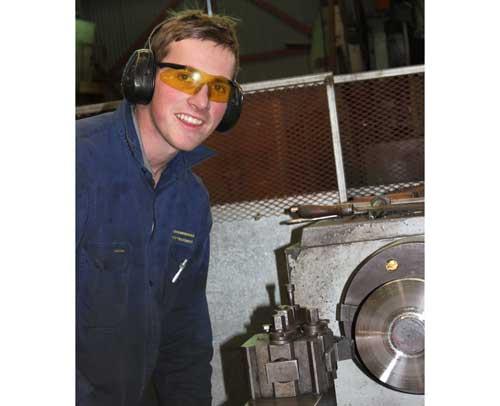“If we want to sustain the future of engineering in New Zealand, we need to train people.” This is the belief of Barry Robinson, and one of the founding values of S.A.F.E Ltd where Barry is General Manager. S.A.F.E, or South Auckland Forging Engineering, is a multi-faceted engineering company formed 43 years’ ago – the only forging and heat treatment plant of its type in New Zealand. But what’s unique about this company is that all nine staff are either fully qualified or training to become qualified, with five tradespeople, two degree-qualified, and two apprentices. “Without training, the skills of our trade will be lost forever. Forging hasn’t been taught as a trade since long before I was an apprentice,” says Barry. “So we have to teach these skills in-house. Our apprentices are the future of the industry – without them we’d have to import these skills from a diminishing pool of overseas skills.”
Importing skills is a short-term solution and an undesirable one given our high youth unemployment rate and the pool of candidate’s right under our noses just waiting for work. So why aren’t more companies taking on apprentices? Research released by Competenz, the Industry Training Organisation (ITO) for the Engineering, Manufacturing and Food & Beverage Manufacturing sectors, shows that a barrier preventing more from training is a lack of management support. Yet S.A.F.E have no more management support than the next company, and are clearly successful in the recruiting, managing and nurturing of their apprentices. So how do they do it?
First, they ensure the right people are recruited for the job. “It starts with the attitude of new employees – people who turn up on time with a great work ethic,” says Richard Johnstone, Project Manager at S.A.F.E. And new staff need to be prepared to start from the bottom and work hard to learn. “Occasionally they might be doing what could be considered ‘boring’ jobs if that’s what’s required – so we need people who will give everything a go,” says Richard. “What sets people apart is one person’s ability to learn a vast amount from the same task others would learn nothing from.” Numeracy skills also rank highly. “Engineering is 90 percent maths. Even if it’s just counting product into a bin, it’s very embarrassing for the company if the wrong number of units are sent out to a customer,” says Richard. And Barry is looking for something more – “They have to have mechanical aptitude. I take interviewees into the workshop and show them something we’ve made. There are two responses. Either they’ll say ‘Oh yeah’ or they’ll ask ‘How do you make this?’ and you can tell they are fascinated by the process – we look for those people with an inquisitive mind.”
But an apprentice can’t be left to their own devices, they require supervision and nurturing, something S.A.F.E agree can be a challenge. “It’s hard finding a good tradesman who is also a good trainer,” says Barry. “25 years ago we could just hire labourers. We were churning out gate hinges and simple bolts, a high volume low skilled job. But our business has evolved and these jobs have gone overseas – now we require all of our staff to be qualified so they are capable of the highly skilled specialist jobs we have today,” says Barry. “There has to be that aura of constant learning.”



